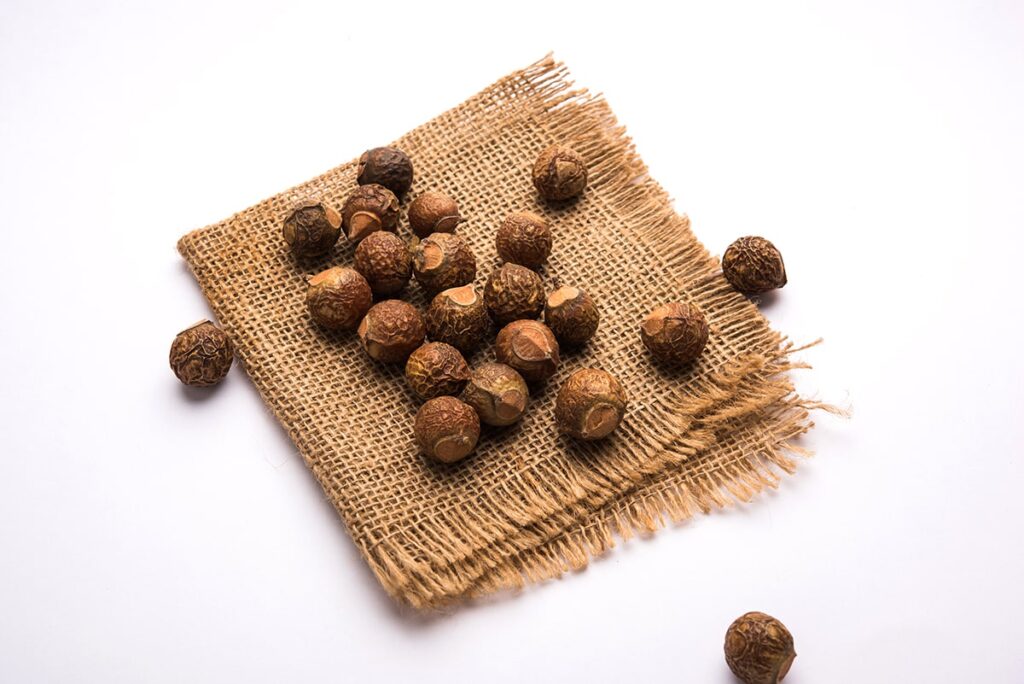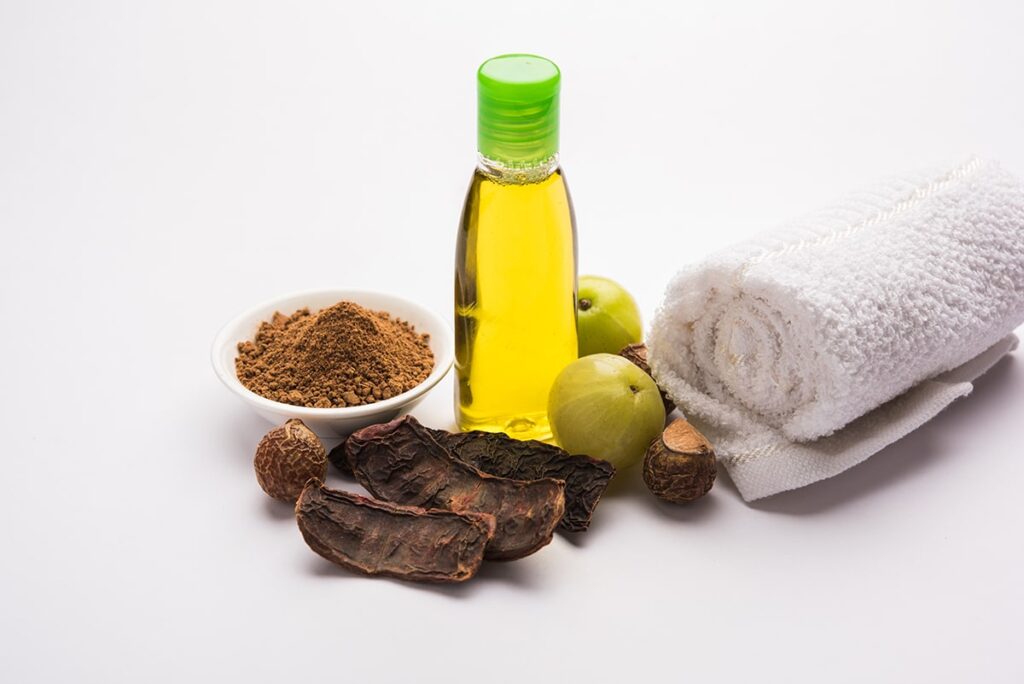Understanding Ayurvedic Shampoo
What is Ayurvedic Shampoo?
The Roots in Ayurveda
Ayurvedic shampoo is much more than just a hair cleansing product; it’s a natural remedy steeped in the ancient Indian tradition of Ayurveda. This holistic approach to wellness, dating back over 5,000 years, emphasizes balance in bodily systems and uses herbal treatments to promote health and well-being. Ayurvedic shampoos are crafted with this philosophy in mind, aiming to not only clean your hair but also to bring balance to your body’s doshas (Vata, Pitta, and Kapha) which in turn affects hair health.
Key Characteristics
The defining characteristics of Ayurvedic shampoos hinge on their natural composition. They are typically infused with a blend of herbs, oils, and natural extracts, each selected for their specific benefits to hair and scalp health. Common ingredients include Amla (Indian Gooseberry), Reetha (Soapnut), and Shikakai (Acacia Concinna), known for their strengthening, nourishing, and cleansing properties.
These shampoos are free from sulfates, parabens, and synthetic chemicals, making them a gentler and more natural alternative to conventional shampoos. This composition not only helps maintain the natural oils and pH balance of your scalp but also ensures a minimal environmental footprint.
In essence, using an Ayurvedic shampoo is not just a hair care choice, but a decision to embrace a more natural and holistic approach to your overall health and beauty regimen.
The Role of Doshas in Hair Care

In Ayurvedic philosophy, understanding and balancing the three doshas – Vata, Pitta, and Kapha – is crucial for overall health, including hair health. Each dosha impacts different hair types in unique ways, and identifying your dominant dosha can guide you to the most suitable Ayurvedic shampoo for your needs.
Vata and Hair Health
Characteristics of Vata Hair
Vata hair is typically characterized by dryness, thinness, and a tendency towards frizziness and split ends. If your hair is prone to tangling and lacks luster, it may indicate a Vata imbalance.
Ayurvedic Ingredients for Vata
To nurture Vata hair, Ayurvedic shampoos often incorporate hydrating and enriching ingredients. Look for products with oils like coconut and sesame, and herbs like Bhringraj and Amla, which deeply moisturize and strengthen the hair, combating dryness and brittleness.
Pitta and Hair Health
Characteristics of Pitta Hair
Pitta hair is usually fine and silky but prone to premature thinning and graying. Excessive scalp heat and oiliness are common signs of a Pitta imbalance.
Ayurvedic Ingredients for Pitta
Shampoos that cool and soothe are ideal for Pitta hair. Ingredients like Brahmi, Neem, and Aloe Vera help balance scalp oil production, reduce heat, and prevent hair thinning and graying.
Kapha and Hair Health
Characteristics of Kapha Hair
Kapha hair tends to be thick, lustrous, but often excessively oily and heavy. Scalp buildup and sluggish hair growth can indicate a Kapha imbalance.
Ayurvedic Ingredients for Kapha
To combat the oiliness and heaviness characteristic of Kapha hair, choose shampoos with purifying and invigorating ingredients. Herbs like Triphala, Green Tea, and Lemon work to cleanse excess oil and promote volume and lightness.
By understanding your dosha and choosing an Ayurvedic shampoo that aligns with it, you can effectively address your specific hair concerns, leading to healthier, more balanced hair.
Herbal Ingredients in Ayurvedic Shampoo
The essence of Ayurvedic shampoo lies in its herbal composition. These natural ingredients, each with unique properties, work in harmony to nurture and revitalize hair and scalp.
Amla (Indian Gooseberry)

Benefits for Hair
Amla, a powerhouse of antioxidants and Vitamin C, is a cornerstone in Ayurvedic hair care. It strengthens hair follicles, promotes hair growth, and enhances overall hair health. Regular use of amla-enriched shampoos can also help in reducing premature graying and maintaining the hair’s natural color and shine.
Reetha (Soapnut)

Natural Cleansing Properties
Reetha is known for its gentle cleansing properties. It effectively removes dirt and excess oils without stripping the hair of its natural moisture, making it an ideal ingredient for those with sensitive scalps or dry hair. Its natural foaming action leaves the hair clean and soft.
Shikakai (Acacia Concinna)

Nourishment and Strengthening
Shikakai is a natural hair cleanser and conditioner. Rich in vitamins and micronutrients, it strengthens hair roots, promotes growth, and provides deep nourishment. Its low pH ensures that the hair remains smooth and lustrous after washing.
Other Key Ingredients
Neem, Brahmi, Bhringraj, and Tulsi
These ingredients bring their unique benefits to Ayurvedic shampoos. Neem, with its antibacterial properties, helps combat scalp issues like dandruff and itching. Brahmi promotes fuller and thicker hair growth. Bhringraj is renowned for its effectiveness in hair regrowth and preventing baldness. Tulsi, a natural stress reliever, helps maintain a healthy scalp.
Each of these ingredients plays a pivotal role in enhancing the health and vitality of your hair, making Ayurvedic shampoos a holistic solution for various hair concerns.
Benefits of Sulfate-Free Ayurvedic Shampoos
In the realm of hair care, the shift towards sulfate-free shampoos has been significant, and Ayurvedic shampoos are at the forefront of this movement. Understanding why sulfate-free Ayurvedic shampoos can be a game-changer for your hair care routine is essential.
Preserving Natural Hair Oils
Sulfates are known for their deep cleaning action, but they can be too harsh, stripping hair of its natural oils and moisture. This can lead to dry, brittle hair and an irritated scalp. Ayurvedic shampoos, free from sulfates, gently cleanse the hair while maintaining its natural oil balance. This approach not only keeps your hair moisturized and healthy but also enhances its natural luster and strength.
Suitable for Sensitive Scalps
For those with sensitive scalps or conditions like eczema or psoriasis, sulfate-free Ayurvedic shampoos are a blessing. The gentle, natural ingredients in these shampoos provide effective cleansing without the irritation that sulfates can cause. This makes Ayurvedic shampoos a safe and soothing option, helping to reduce scalp inflammation and discomfort.
The use of natural, sulfate-free ingredients in Ayurvedic shampoos aligns with the Ayurvedic principle of harmony and balance, promoting hair health without compromising the integrity of your scalp or hair’s natural state.
The Importance of Natural Oils and pH Balance
Ayurvedic shampoos are not just about cleansing; they are about maintaining the natural harmony of your scalp and hair. An essential aspect of this is the preservation of natural oils and the pH balance, which are key to healthy hair and scalp.
Commonly Used Oils in Ayurvedic Shampoos
Coconut, Almond, and Argan Oil
These natural oils are staples in Ayurvedic hair care. Coconut oil penetrates deep into the hair shaft, providing moisture and nourishment. Almond oil is rich in Vitamin E, offering strength and sheen to your tresses. Argan oil, known as ‘liquid gold,’ is packed with antioxidants and essential fatty acids that protect and rejuvenate the hair. When included in shampoos, these oils ensure your hair is not stripped of its natural oils during washing.
Maintaining Scalp pH
A healthy scalp has a slightly acidic pH, which keeps the cuticles closed and healthy. Many commercial shampoos disrupt this natural pH balance, leading to hair problems. Ayurvedic shampoos are carefully formulated to maintain the natural pH level of the scalp. Ingredients like Amla and Shikakai naturally have a pH level that is similar to that of the scalp, helping to preserve the integrity of the hair and prevent issues like frizz and breakage.
By choosing Ayurvedic shampoos that focus on preserving natural oils and maintaining scalp pH, you are not only cleansing your hair but also ensuring its long-term health and vitality.
Ayurvedic Shampoo for Scalp Health
A healthy scalp is the foundation of healthy hair. Ayurvedic shampoos are not just about cleaning your hair; they also focus on nurturing and healing the scalp. Let’s explore how Ayurvedic shampoos contribute to scalp health.
Treating Scalp Issues with Ayurveda
Dandruff, Dryness, and Scalp Irritation
Common scalp issues like dandruff, dryness, and irritation can be effectively addressed with Ayurvedic shampoos. Ingredients like Neem and Tulsi have antifungal and antibacterial properties, which help combat dandruff and scalp infections. For dryness, oils like coconut and almond provide deep hydration, soothing the scalp and reducing flakiness.
Preventative Care and Maintenance
Regular use of Ayurvedic shampoo can help prevent common scalp issues before they start. By balancing the doshas and using natural ingredients that promote scalp health, these shampoos maintain a healthy environment on your scalp. This preventative approach is key in Ayurveda, ensuring that your scalp remains healthy, thereby supporting strong and vibrant hair growth.
Incorporating an Ayurvedic shampoo into your hair care routine not only cleanses your hair but also ensures a healthy, balanced, and nourished scalp, leading to overall hair wellness.
Ayurvedic Approach to Holistic Wellness and Beauty
Ayurveda is not just a medical practice; it’s a lifestyle. This ancient wisdom teaches us that the health of our hair is deeply connected to our overall well-being. Let’s explore how Ayurvedic shampoo plays a role in this holistic approach.
External Beauty and Internal Health Connection
In Ayurveda, hair health is seen as a reflection of our overall health. Issues like hair fall, dryness, or excessive oiliness are not just topical problems but signs of internal imbalances. Ayurvedic shampoos are formulated not only to address these external symptoms but also to help restore internal balance. The use of natural herbs and oils in these shampoos is aligned with this philosophy, aiming to bring balance to the doshas (Vata, Pitta, and Kapha) which in turn improves hair health.
Ayurvedic Lifestyle Tips for Hair Care
Incorporating Ayurvedic principles into your daily routine can enhance the benefits of your Ayurvedic shampoo. Here are some tips:
- Diet: Include a balanced diet rich in fruits, vegetables, whole grains, and healthy fats. Ayurveda emphasizes the importance of a diet that balances your dominant dosha.
- Hydration: Drink plenty of water to keep your body and hair hydrated.
- Stress Management: Practices like yoga and meditation can reduce stress, which is often a culprit behind hair problems.
- Regular Massage: Regular scalp massages with Ayurvedic oils can stimulate hair growth and improve hair health.
- Adequate Sleep: Getting enough rest is crucial for overall health and the well-being of your hair.
By adopting an Ayurvedic lifestyle and using Ayurvedic shampoo, you not only improve your hair health but also embark on a journey towards overall wellness and beauty.
Choosing the Right Ayurvedic Shampoo
Selecting the most suitable Ayurvedic shampoo for your hair type and needs is crucial. With various options available, it’s important to know what to look for. Here are some tips to guide you in making the right choice.
Customization Based on Hair Type and Dosha Imbalance
The unique aspect of Ayurvedic shampoos is their alignment with individual hair types and doshas. Understanding your dominant dosha (Vata, Pitta, or Kapha) can significantly influence your choice. For example:
- Vata-dominated individuals with dry, brittle hair should look for shampoos that are moisturizing and nourishing.
- Pitta-dominated individuals should opt for shampoos that offer cooling and soothing properties, ideal for sensitive scalps.
- Kapha-dominated individuals need shampoos that provide deep cleansing and are invigorating to prevent oiliness and promote volume.
Tips for Identifying Authentic Ayurvedic Products
With the market flooded with numerous products claiming to be Ayurvedic, identifying genuine Ayurvedic shampoos can be challenging. Here are some tips:
- Check the Ingredient List: Genuine Ayurvedic shampoos should contain natural herbs, oils, and extracts like Amla, Neem, Shikakai, and others, without harmful chemicals or synthetics.
- Brand Reputation: Opt for brands with a good reputation and history in Ayurvedic practices.
- Certifications: Look for certifications that assure the product’s authenticity and adherence to Ayurvedic formulations.
- Avoid Misleading Labels: Be cautious of products labeled as ‘Ayurvedic-like’ or ‘Ayurvedic-inspired’, as they may not be true to traditional formulations.
- Packaging and Preservation: Authentic Ayurvedic shampoos often use minimal and eco-friendly packaging and avoid harsh preservatives.
By carefully selecting your Ayurvedic shampoo based on your specific hair type and dosha, and ensuring the authenticity of the product, you can enjoy the full benefits of Ayurvedic hair care tailored to your needs.
Pros and Cons: Ayurvedic Shampoo vs. Conventional Shampoo
When it comes to choosing a shampoo, the decision often boils down to Ayurvedic versus conventional options. Each has its benefits and drawbacks, and understanding these can help you make a more informed choice.
Pros of Ayurvedic Shampoo
Natural Ingredients
Ayurvedic shampoos are renowned for their use of natural ingredients. Herbs like Amla, Neem, and Shikakai offer a plethora of benefits for the hair and scalp, without the side effects often associated with synthetic chemicals.
Customization for Hair Types
One of the unique aspects of Ayurvedic shampoos is their ability to cater to different hair types and concerns based on dosha imbalances. This means a more personalized hair care approach.
Scalp Health and Hair Nourishment
Ayurvedic shampoos don’t just clean; they nourish. The natural oils and herbs in these shampoos help in maintaining a healthy scalp and strengthening hair from the roots.
Environmental Friendliness
With a focus on natural ingredients, Ayurvedic shampoos are generally more environmentally friendly, aligning with green and sustainable living principles.
Cons of Ayurvedic Shampoo
Availability and Price
Finding authentic Ayurvedic shampoos can be challenging in some areas, and they might come at a higher price point compared to conventional shampoos.
Longer Adaptation Period for Hair
Switching from chemical-based to natural shampoos often requires an adaptation period. During this time, your hair might feel different as it adjusts to the absence of synthetic substances.
Limited Foaming and Scent Varieties
Due to the absence of certain chemicals, Ayurvedic shampoos might not foam as much as conventional ones and may offer fewer scent options.
Pros of Conventional Shampoo
Wide Availability
Conventional shampoos are easily available in most stores, offering convenience in terms of purchase.
Instant Results
Many conventional shampoos are designed for immediate results, like shinier or more voluminous hair after just a few uses.
Variety of Scents and Textures
There’s a wide range of fragrances and textures available in conventional shampoos to cater to different preferences.
Cons of Conventional Shampoo
Harsh Chemicals
Many conventional shampoos contain sulfates, parabens, and other harsh chemicals that can strip natural oils from hair and scalp, potentially leading to long-term damage.
Short-Term Benefits, Long-Term Damage
While the immediate results can be appealing, the long-term effects of chemical-based shampoos can include scalp irritation, hair loss, and diminished hair quality.
Environmental Impact
The production and disposal of conventional shampoos often have a higher environmental impact, contributing to pollution and waste.
In conclusion, while Ayurvedic shampoos offer a more natural and holistic approach to hair care, they might require a commitment to a new hair care routine and may not be as readily available as conventional options. On the other hand, conventional shampoos provide ease of use and immediate results but may come with potential long-term hair health risks and environmental concerns.
FAQs About Ayurvedic Shampoo
In the world of Ayurvedic hair care, several questions frequently arise about the use and effectiveness of Ayurvedic shampoos. Here are some of the most common queries answered:
What Makes Ayurvedic Shampoo Different from Regular Shampoo?
Ayurvedic shampoos are formulated based on ancient Ayurvedic principles, using natural herbs and oils. They focus on balancing the doshas (Vata, Pitta, Kapha) and treating the hair and scalp holistically, unlike regular shampoos that might focus more on cosmetic benefits.
How Often Should I Use Ayurvedic Shampoo?
The frequency of use depends on your hair type and scalp condition. Generally, it’s recommended to wash your hair 2-3 times a week, but those with dry hair or scalp might need to adjust this frequency.
Can Ayurvedic Shampoo Help with Hair Loss?
Many Ayurvedic shampoos contain ingredients like Bhringraj, Amla, and Brahmi, which are known for promoting hair growth and reducing hair fall. However, the effectiveness can vary based on the individual’s hair and scalp condition.
Is Ayurvedic Shampoo Suitable for All Hair Types?
Yes, Ayurvedic shampoos are typically suitable for all hair types. They are especially beneficial for those with specific hair concerns like dryness, oiliness, or scalp conditions, as they can be chosen based on the individual’s dosha.
Are There Any Side Effects of Using Ayurvedic Shampoo?
Ayurvedic shampoos made from natural ingredients are generally safe and free from harmful side effects. However, it’s always best to check for allergies to any specific ingredients.
How Long Does It Take to See Results from Ayurvedic Shampoo?
It might take a few weeks to notice significant changes as your hair and scalp adjust to the natural ingredients. Patience is key when switching to Ayurvedic hair care products.
Can Ayurvedic Shampoo Be Used on Color-Treated Hair?
Generally, Ayurvedic shampoos are safe for color-treated hair as they are mild and free from harsh chemicals. However, it’s advisable to check the specific ingredients and perhaps do a patch test.
How to Store Ayurvedic Shampoo for Maximum Shelf Life?
Store your Ayurvedic shampoo in a cool, dry place away from direct sunlight. Make sure the cap is tightly closed to prevent the product from deteriorating.
These answers should provide a clearer understanding of Ayurvedic shampoos and help you make informed decisions about incorporating them into your hair care regimen.
Sustainability and Ethical Practices in Ayurvedic Shampoo Production
In today’s world, where environmental concerns are paramount, it’s essential to understand the sustainability and ethical practices behind Ayurvedic shampoo production. This understanding not only helps in making responsible choices but also aligns with the core principles of Ayurveda, which emphasize harmony with nature.
Environmental Impact of Ingredients and Manufacturing
Ayurvedic shampoos are typically made with natural ingredients, which have a lower environmental impact compared to synthetic chemicals used in conventional shampoos. The production process of Ayurvedic shampoos often involves:
- Reduced Chemical Usage: Minimizing harmful chemicals protects water sources and soil from pollution.
- Biodegradability: Natural ingredients are more biodegradable, reducing the ecological footprint.
- Energy Efficiency: Many Ayurvedic manufacturers adopt energy-efficient processes to minimize carbon emissions.
Ethical Sourcing and Fair Trade Practices
Ethical sourcing is a crucial aspect of Ayurvedic shampoo production. This includes:
- Sourcing from Local Communities: Many ingredients are sourced from local growers, supporting community livelihoods.
- Fair Compensation: Ensuring fair trade practices that provide just compensation to farmers and workers involved in the supply chain.
- Sustainable Harvesting: Ayurvedic ingredients are often harvested sustainably, ensuring that natural resources are conserved for future generations.
By choosing Ayurvedic shampoos that are produced with sustainability and ethical practices in mind, consumers can contribute to a healthier planet while enjoying the natural benefits of these products. This approach to hair care is not just about looking good but also about feeling good by making responsible and ethical choices.
Real User Experiences and Testimonials
Hearing from real users who have incorporated Ayurvedic shampoos into their hair care routine can be both inspiring and informative. Here, we share some experiences and testimonials to provide a genuine perspective on the impact of these natural hair care products.
Success Stories and Transformations
Many users report significant improvements in their hair health after switching to Ayurvedic shampoos. Common themes in these success stories include:
- Reduced Hair Fall: Users often notice a decrease in hair fall, attributing this change to the strengthening properties of Ayurvedic ingredients.
- Improved Scalp Health: Reports of reduced dandruff and scalp irritation are common, thanks to the natural, soothing ingredients.
- Enhanced Hair Texture: Enhanced softness, shine, and overall texture are frequently mentioned, as Ayurvedic shampoos nourish and rejuvenate hair.
Comparisons with Previous Hair Care Routines
Comparing their experiences with conventional products, many users find Ayurvedic shampoos to be more harmonious with their hair and scalp needs. Key differences noted include:
- Gentleness: Unlike some conventional shampoos that can strip hair of its natural oils, Ayurvedic shampoos are praised for their gentle cleansing action.
- Long-term Benefits: Users often observe that while the results with Ayurvedic shampoos may take longer to manifest, the benefits are more sustainable and holistic.
- Overall Wellness: Many appreciate the holistic approach of Ayurvedic shampoos, noting improvements not just in hair health but in overall well-being.
These real-life experiences highlight the potential benefits of adopting an Ayurvedic approach to hair care, providing valuable insights for anyone considering making the switch to Ayurvedic shampoos.
Incorporating Ayurvedic Shampoo into Your Hair Care Routine
Adopting Ayurvedic shampoo into your hair care routine can be a transformative experience. However, to reap the full benefits, it’s essential to use these products correctly and complement them with other Ayurvedic practices. Here are some tips to effectively incorporate Ayurvedic shampoo into your routine.
Application Techniques for Maximum Benefit
- Gentle Massage: When applying Ayurvedic shampoo, gently massage it into your scalp with your fingertips. This stimulates blood circulation, enhancing the nourishment provided by the natural ingredients.
- Lukewarm Water: Rinse your hair with lukewarm water before application. This opens up the hair cuticles and scalp pores, allowing deeper penetration of the shampoo.
- Adequate Quantity: Use enough shampoo to create a mild lather. Remember, Ayurvedic shampoos may not lather as much as conventional ones due to the absence of harsh sulfates.
- Leave-in Time: Allow the shampoo to sit on your scalp for a couple of minutes to enable the absorption of the herbal ingredients.
- Rinsing Thoroughly: Rinse your hair thoroughly to ensure no residue is left behind, as this could lead to build-up and scalp issues.
Complementing with Ayurvedic Dietary and Lifestyle Practices
Enhance the effects of Ayurvedic shampoo by integrating Ayurvedic principles into your lifestyle:
- Balanced Diet: Consume a balanced diet rich in fruits, vegetables, nuts, and seeds. Ayurveda emphasizes the importance of a diet that aligns with your dominant dosha.
- Hydration: Stay well-hydrated to maintain overall health, including the health of your hair and scalp.
- Regular Exercise: Engage in regular physical activity to improve blood circulation, promoting hair growth and health.
- Stress Management: Adopt stress-reducing practices like yoga and meditation, as stress can adversely affect hair health.
- Natural Hair Masks: Use natural hair masks and oils, such as Amla oil or a mixture of coconut oil and Brahmi, to nourish your hair further.
Incorporating Ayurvedic shampoo into your routine is more than just changing a product; it’s about embracing a holistic approach to hair care that aligns with your body’s natural rhythms and needs.
Future Trends in Ayurvedic Hair Care
The world of Ayurvedic hair care is constantly evolving, with new innovations and developments shaping its future. As an Ayurvedic expert, I’m excited to share some insights into the trends that are likely to influence Ayurvedic shampoos and hair care practices in the coming years.
Innovations and New Developments
The integration of modern science with ancient Ayurvedic wisdom is leading to the creation of more effective and user-friendly products. Future innovations may include:
- Advanced Formulations: Combining Ayurvedic ingredients with new scientific techniques to enhance their efficacy and shelf life without compromising their natural qualities.
- Customized Solutions: The development of more personalized Ayurvedic hair care products, tailored to individual hair types, scalp conditions, and dosha imbalances.
- Eco-friendly Packaging: As sustainability becomes more critical, expect to see Ayurvedic shampoos in biodegradable or recyclable packaging.
Ayurvedic Shampoo in the Global Market
Ayurvedic hair care products are gaining popularity worldwide, not just in India. This global expansion is driven by:
- Increased Awareness: More people are seeking natural and holistic alternatives to chemical-laden hair products.
- Cultural Exchange: As the world becomes more interconnected, the rich traditions of Ayurveda are reaching new audiences.
- Wellness Movement: The growing focus on wellness and natural living is pushing Ayurvedic hair care into the mainstream market.
The future of Ayurvedic hair care looks promising, with its blend of tradition and innovation offering natural, effective solutions for a wide range of hair care needs. As the world embraces Ayurveda’s holistic approach, Ayurvedic shampoos are set to become a significant part of global hair care routines.

0 Responses
Как подчёркивает заведующая кафедрой наркологии РМАНПО Минздрава России, «качество оказания помощи зависит не от количества процедур, а от правильной организации лечебного процесса и квалификации команды». Именно поэтому особенно важно понимать, какие параметры следует учитывать при выборе клиники.
Изучить вопрос глубже – [url=https://narkologicheskaya-klinika-pervouralsk11.ru/]наркологическая клиника стационар[/url]